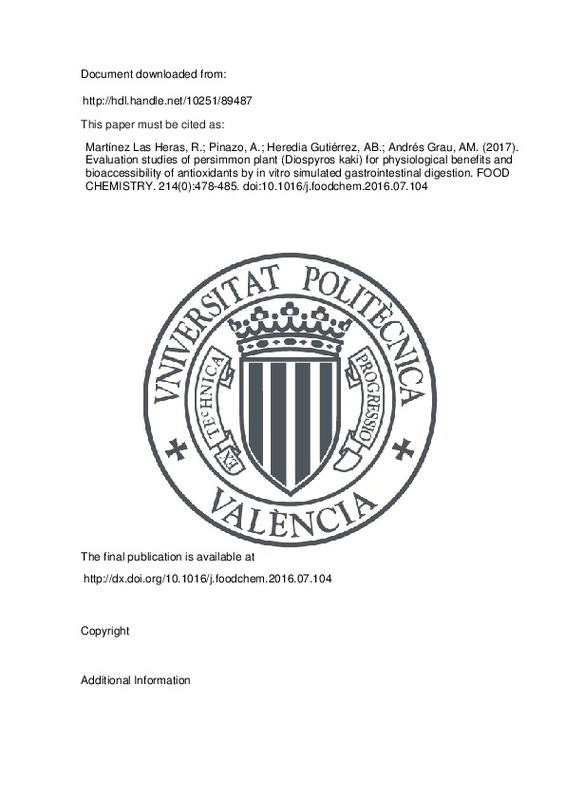JavaScript is disabled for your browser. Some features of this site may not work without it.
Buscar en RiuNet
Listar
Mi cuenta
Estadísticas
Ayuda RiuNet
Admin. UPV
Evaluation studies of persimmon plant (Diospyros kaki) for physiological benefits and bioaccessibility of antioxidants by in vitro simulated gastrointestinal digestion
Mostrar el registro sencillo del ítem
Ficheros en el ítem
| dc.contributor.author | Martínez las Heras, Ruth
|
es_ES |
| dc.contributor.author | Pinazo, A.
|
es_ES |
| dc.contributor.author | Heredia Gutiérrez, Ana Belén
|
es_ES |
| dc.contributor.author | Andrés Grau, Ana María
|
es_ES |
| dc.date.accessioned | 2017-10-19T07:07:20Z | |
| dc.date.available | 2017-10-19T07:07:20Z | |
| dc.date.issued | 2017 | es_ES |
| dc.identifier.issn | 0308-8146 | es_ES |
| dc.identifier.uri | http://hdl.handle.net/10251/89487 | |
| dc.description.abstract | [EN] This study aims to analyze the antioxidant benefits from persimmon leaf tea, fruit and fibres taking into account their changes along gastrointestinal digestion. The evolution of polyphenols, flavonoids and antioxidant capacity was studied using the recent harmonized in vitro protocol published by Minekus et al. (2014). The digestion was performed with and without digestive enzymes. Results showed aqueous leaf extract was richer in antioxidants than the fruit or the extracted fibres. Nevertheless, persimmon-leaf antioxidants were more sensitive to the digestive environment. In general, the oral conditions greatly affected the antioxidants, while gastric digestion led to slight additional losses. The intestinal step enhanced polyphenols and flavonoids solubility coming from the fruit and fibres. Additionally, the presence of digestive enzymes positively contributed to antioxidant release throughout digestion. Finally, the bioaccessibility of polyphenols, flavonoids and antioxidant activity of persimmon fruit were 1.4, 1.0 and 3.8 times higher than in aqueous leaf extract. | es_ES |
| dc.description.sponsorship | The authors thank the Universitat Politecnica de Valencia for the PhD scholarship given to Ruth Martinez-Las Heras. | en_EN |
| dc.language | Inglés | es_ES |
| dc.relation.ispartof | FOOD CHEMISTRY | es_ES |
| dc.rights | Reserva de todos los derechos | es_ES |
| dc.subject | Persimmon | es_ES |
| dc.subject | Fibres | es_ES |
| dc.subject | Aqueous leaf extract | es_ES |
| dc.subject | Antioxidant compounds | es_ES |
| dc.subject | Gastro-intestinal digestion | es_ES |
| dc.subject | Bioaccessibility | es_ES |
| dc.subject.classification | TECNOLOGIA DE ALIMENTOS | es_ES |
| dc.title | Evaluation studies of persimmon plant (Diospyros kaki) for physiological benefits and bioaccessibility of antioxidants by in vitro simulated gastrointestinal digestion | es_ES |
| dc.type | Artículo | es_ES |
| dc.identifier.doi | 10.1016/j.foodchem.2016.07.104 | es_ES |
| dc.rights.accessRights | Abierto | es_ES |
| dc.date.embargoEndDate | 2018-01-01 | es_ES |
| dc.contributor.affiliation | Universitat Politècnica de València. Departamento de Tecnología de Alimentos - Departament de Tecnologia d'Aliments | es_ES |
| dc.contributor.affiliation | Universitat Politècnica de València. Instituto Universitario de Ingeniería de Alimentos para el Desarrollo - Institut Universitari d'Enginyeria d'Aliments per al Desenvolupament | es_ES |
| dc.description.bibliographicCitation | Martínez Las Heras, R.; Pinazo, A.; Heredia Gutiérrez, AB.; Andrés Grau, AM. (2017). Evaluation studies of persimmon plant (Diospyros kaki) for physiological benefits and bioaccessibility of antioxidants by in vitro simulated gastrointestinal digestion. FOOD CHEMISTRY. 214:478-485. doi:10.1016/j.foodchem.2016.07.104 | es_ES |
| dc.description.accrualMethod | S | es_ES |
| dc.relation.publisherversion | http://dx.doi.org/10.1016/j.foodchem.2016.07.104 | es_ES |
| dc.description.upvformatpinicio | 478 | es_ES |
| dc.description.upvformatpfin | 485 | es_ES |
| dc.type.version | info:eu-repo/semantics/publishedVersion | es_ES |
| dc.description.volume | 214 | es_ES |
| dc.relation.pasarela | S\317747 | es_ES |
| dc.contributor.funder | Universitat Politècnica de València |







![[Cerrado]](/themes/UPV/images/candado.png)

